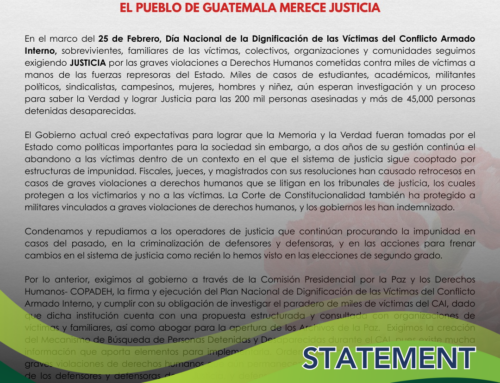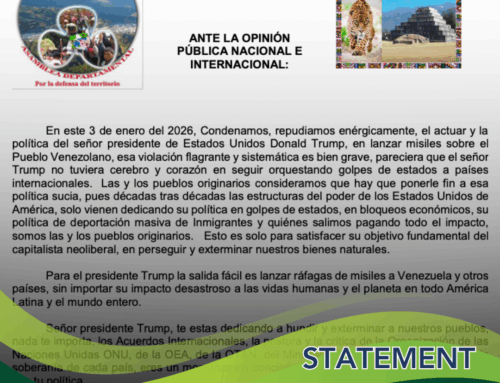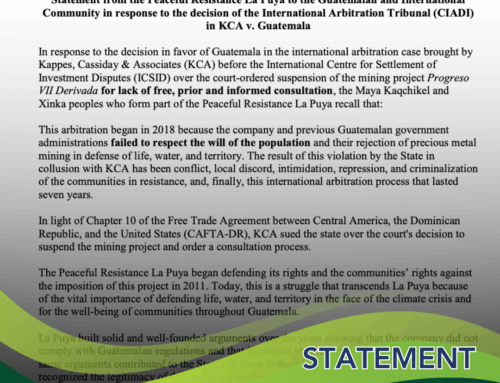Guatemalan Elections to be Held this Sunday
On June 16, the Guatemalan people will vote in national presidential and congressional elections. Though Congressional representatives will be decided this weekend, a second round of presidential elections will be held in September if no single candidate gets more than 50% of the votes.
Already, the electoral process has been turbulent, with several presidential candidates disqualified during their campaigns because of Constitutional prohibitions against their candidacy (Zury Ríos), drug trafficking charges (Mario Estrada), and politically motivated charges (Thelma Aldana). Of the three early presidential front runners -- Sandra Torres, Thelma Aldana, and Zury Ríos -- two have been disqualified. The third, Sandra Torres has faced accusations of illicit campaign financing and is the target of the urban-led campaign, #NoTeToca (#It'sNotYourTurn), which is likely to result in her loss, either in the first round or the second.
|
|

|
|
Thelma Cabrera's Historic Run for President
In a field of far-right candidates with deep military and oligarchy ties, the candidacy of Thelma Cabrera has provided a spark of hope. An Indigenous Maya Mam woman who has lived systemically-imposed poverty, Cabrera is one of Guatemala's top five presidential contenders.
In a society plagued by racism, sexism, and classism, Cabrera's candidacy is truly historic. Representing Movement for the Liberation of the Peoples (MLP), the political wing of the Committee of Campesino Development (CODECA), Cabrera first gained support in rural areas from her years of community organizing. More recently, she has gained growing support from urban voters tired of corruption.
In her platform, Cabrera calls for the nationalization of electricity and other public services, which have been privatized and concentrated in the hands of a few, as well as community recuperation of territories and waters. Calling Guatemala a "failed state" in which public institutions respond to private interests over the will of the people, Cabrera also calls for a Plurinacional Constituent Assembly to create a truly representative government. Her platform seeks to move Guatemala towards "buen vivir" and food sovereignty, while fighting against corruption and lowering pay for government officials, including the president.
Photo Credit: Prensa Libre
|
|
The Illusion of Choice in a Field of "Far Right, Pro-Kaibil, Theocratic" Candidates
The presidential elections feature candidates from 19 parties, with 26 parties running congressional candidates. While some might interpret the multitude of parties as a marker of a healthy democracy, anthropologist Alejandro del Águila notes in El Observador that the overwhelming majority of the parties are made up of the most regressive forces, including the military, the oligarchy, and religious extremists, who have sought to consolidate their forces through elections. Furthermore, most of the parties are merely "recycled" from earlier ultra-conservative parties that had previously been shut down.
Many human rights organizations see this as a dangerous moment. Those conservative business and military interests are combining forces to push forward regressive policies, including two initiatives begun under the current executive and legislative tenures, as part of the #PactOfTheCorrupt: attempts to shield themselves from prosecution for crimes of the past through Amnesty legislation and to protect themselves from corruption charges through attacks on the CICIG and changes to the penal code that would lower penalties for corruption.
With a cast of presidential and Congressional candidates who have proven to be pro-military and pro-oligarchy, Guatemalan organizations fear that in the next four years, they will continue to see assaults on justice, historical memory, environmental defense, sexual and reproductive rights, community self-determination ... and on human rights defenders themselves.
|
|
Stay Tuned This Sunday
This Sunday, Guatemala will vote! Stay tuned to learn more about election results and what they will mean for Guatemalan partners' struggles for justice, memory, environmental defense, and self-determination.
|
|
|
At NISGUA, we recognize that while electoral politics have real impacts on communities' and activists' security, well-being, and organizing, true change comes from grassroots movements. That's why we continue to stand with Guatemalan activists struggling in locally-based, globally-significant movements for environmental defense, Indigenous and campesino rights, and justice. Please support our advocacy, accompaniment, and cross-border connection-building today!
|
|
|
Martha Schmitz, GAP Coordinator
with the entire NISGUA team, Claire, Bridget, David and Meredith
|
|
|
|
|









Leave A Comment